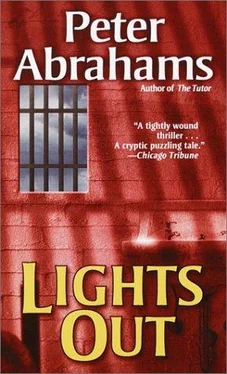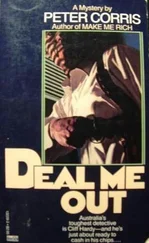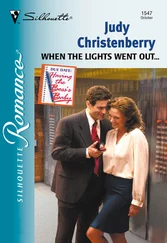Eddie found the used bookstore. This time he noted its name: Gold’s Books-Fine, Used, and Rare. The paperback bin was empty because of the rain. Eddie went in. The bell tinkled. The boy in the skullcap was reading at the desk. He looked up. There was a pimple on his forehead, making Eddie think of those high-caste Indians.
“Another holiday?” Eddie said.
“It’s Sunday.”
He would have to learn to keep track of the days again.
“We’re not really open,” the boy went on. “I just come here because it’s… quieter.”
Eddie listened. The sounds of the city were barely audible, as if all the books could somehow muffle them.
“What’s your name?” Eddie said.
The boy hesitated.
“Mine’s Ed. Ed Nye.”
“Pinchas,” said the boy, and again Eddie imagined what would happen to him in prison, again felt his stomach turn.
“I need some help,” Eddie said. “I’ll pay you for it.”
The boy closed his book: The Comedians . “I’m not really an expert when it comes to poetry,” he said.
“This isn’t about poetry.”
“Is it legal?”
Eddie laughed. “Why do you ask that?”
The boy bit his lip.
How to put him at ease? Eddie didn’t know. He smiled. “Go on,” he said.
“Don’t take this personally.”
“I won’t.”
“But you do look like someone who might do something illegal.”
“Like a hit man, you said.”
“Maybe not so much like a hit man, the way your hair’s growing in.”
Gray. “I’ll tell you something,” Eddie said, perhaps more forcefully than he’d intended, because the boy shrank in his chair: “I’ve never done anything illegal in my life.” In his mind it was true: the three men he’d killed had been in self-defense, and he hadn’t known what had been hidden away on Fearless . He’d done nothing illegal, but the look had rubbed off on him anyway.
“Nothing?” said Pinchas. His Adam’s apple bobbed, as though a bubble that couldn’t be suppressed was on its way up. “I’ve broken the law myself.”
“You have?”
Pinchas looked down, nodded.
“What did you do?”
“I shoplifted… an object.”
“What was it?”
The boy was silent. From outside came the strangely muted noise of the city. Pinchas spoke. “You won’t tell anybody?”
“Except the FBI.”
Pinchas didn’t laugh, but he got up, moved into the shadows at the back of the store, climbed the stepladder, and reached up to the top of the highest shelf. He returned with something wrapped in tissue paper.
What? Surely not a watch, or jewelry, or an electronic gadget. A rare book, maybe? Or something Jewish that Eddie knew nothing about. That would be it.
Pinchas unwrapped the tissue paper. Inside was a brand-new Minnesota Twins baseball cap. Pinchas didn’t touch it. Slowly his gaze came up, met Eddie’s.
“You stole it?”
“From Herman’s. I walked in, stuck it under my jacket, and walked out. Like I was an automaton or something. I couldn’t help it.”
“But why?”
Pinchas stared down at the cap.
“Couldn’t you have asked your parents to buy it for you?”
“You don’t understand.”
Was the boy poor? Eddie saw nothing to indicate that. “What about saving your own money?”
“It wasn’t the money,” Pinchas said. “It was the act of buying I couldn’t do. That would make it official. Like I consciously made a decision to… possess it. This way it’s just something that happened. The will of…” His voice trailed off.
Eddie picked up the cap. It was made of wool, just like the real ones, but smaller. “Let’s see it on you.”
The boy’s eyes widened. “I can’t.”
“You mean you haven’t tried it on yet?”
Pinchas shook his head quickly from side to side.
Eddie held it out. “Just slide into your automaton mode.”
This time a smile appeared on Pinchas’s face; but quickly vanished. He didn’t move for a few moments. Then, slowly, he took off his skullcap, laid it gently on the desk; it left a circular imprint on his hair. He accepted the Minnesota Twins cap from Eddie in both hands and put it on. It was too big for him, made him appear even younger, nothing like a ball player.
“How do I look?” Pinchas asked.
“Just like Canseco,” Eddie said. He’d watched a thousand games in the rec room.
“I don’t like Canseco,” Pinchas said. “Kirby Puckett’s my favorite.” He went to the dusty window, bent forward, peered at his reflection. He tilted the cap at an angle and came back. He was walking differently, perhaps in imitation of Kirby Puckett or some other slugger.
“What position do you play?” Eddie asked.
“Play?”
“In baseball.”
“Oh,” said the boy, “I’ve never actually played. There’s no time, with the store, and Yeshiva, and Talmud-Torah at night. And even if there was, my parents… they want the best for me. That’s the beauty of this country for them. They’re free to live a life that has nothing to do with it.”
Eddie wasn’t following this too well. “You look like a second baseman,” he said.
“I do?” Pinchas smiled. This time it stayed on his face a little longer. He tugged at the bill of his cap, making a small adjustment. Then he shot Eddie a glance. “I’m sorry for saying you looked like a criminal.”
“A natural mistake,” Eddie said. “I did the penance first, that’s all.”
Pinchas frowned. “Before the crime?”
“The crime that happened had nothing to do with me,” Eddie said. “That’s where I need your help.”
“Help you do what?”
“Find a hospice,” Eddie said.
“Where people go to die?”
“Is there another kind? The problem is I don’t know which one this person is in.”
“Are you going to do something to him?”
“Would that make sense?”
Pause. Then Pinchas started laughing. Eddie laughed too. Pinchas turned to the computer, switched it on. “What kind of hospice?” he said, tapping the keys. “AIDS, cancer, normal dying?”
“We’ll have to try them all.”
Ten minutes later, Pinchas tore off a two-page printout and handed it to Eddie. He picked up the phone and dialed St. Sebastian’s Home, the first one on the list.
Eddie: “I’m trying to find an old friend of mine who’s not well. I thought he might be with you.”
Woman: “What’s his name?”
Eddie: “JFK. That’s what he called himself.”
Woman: “I’ll need his real name.”
Eddie: “I don’t know it.”
Woman: “Sorry.”
Eddie went through similar conversations eight times. The ninth time, a man answered. “The Caring Place,” he said.
Eddie went through his spiel.
“Do you mean Mr. Kidd, by any chance?” asked the man.
“Possibly.”
“We had a Junior Fairbanks Kidd,” said the man. “At least that’s what it said on his passport.”
“A Bahamian passport?” asked Eddie.
“That’s right.”
“You said had .”
“Mr. Kidd left last week.”
“Where did he go?”
“He said he was going home.”
“Does that mean he was better?”
“Better? More reconciled, perhaps. More in tune with the end rhythms of his life.”
Eddie hung up.
Pinchas was watching him from under the bill of his Twins cap. “You’ve seen the world, haven’t you?” he said.
“Parts.”
“That’s why you’re interested in ‘The Mariner.’ All that sailing.”
Eddie shook his head. “I’m interested in it…” He paused. Why? An answer came: “because it’s a beautiful thing that doesn’t make sense.”
“Doesn’t make sense?”
“Because the punishment doesn’t fit the crime. How can it when the nature of the crime’s a mystery?”
Читать дальше












